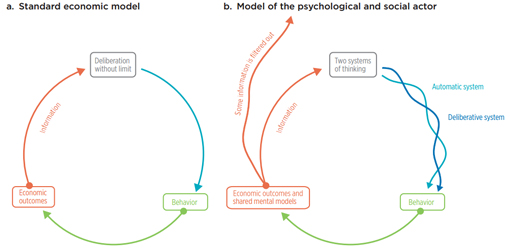Michael Grubb kritiserar Nicholas Stern för att i sin nya bok ta alltför lättvindigt på behovet av att djupare förstå hur ekonomiska institutioner behöver utvecklas för att klara den globala uppvärmningen. Grubb skriver:
However, Stern does not adequately delve into the fact that too much analysis, modelling and policy is still dominated by the idea that there is a natural ‘least-cost’ energy system, and that market forces would deliver it if we only corrected market failures. This reflects the inbuilt assumptions of neoclassical economics.
Det är samma sorts tänkesätt som våra egna svenska myndigheter, främst Konjunkturinstitutet och Energimyndigheten, för fram. Särskilt i termer av att det inte finns några “marknadsmisslyckanden” som fordrar korrektion. Underförstått att om potentialen för effektivare användning inte realiseras så beror det antingen på att “marknaden” inte vill ha dessa lösningar eller på att samma marknad så småningom kommer att fixa det - bara vänta så får ni se.
Detta synsätt har börjat utmanas runt om i världen och kanske mest tydligt av Världsbanken i deras utvecklingsrapport 2015 där de skriver:
“Economic man” is a fiction, not a reality. Policies that assume that rational decision making will always prevail can go astray in many contexts and may miss opportunities for low-cost, higheffi cacy interventions. Updating the standard assumptions about human decision making is essential to pushing forward the frontier of development
I sitt inledande kapitel visar Världsbanken en alternativ modell som kan ha stor betydelse för att både förstå och kunna utforma styrmedel för effektvisering (se också bild nedan).
This first part of this Report presents a framework for understanding and using recent findings on human decision making
1. (Thinking automatically.) Much of our thinking is automatic, not deliberative.
2. (Thinking socially.) Humans are not autonomous thinkers or decision makers but deeply social animals.
3. (Thinking with mental models.) Individuals do not respond to objective experience but to mental representations of experience constructed from culturally available mental models

Skrivet av Hans Nilsson, 2015-05-05.
(0) Kommentarer • Permalink
